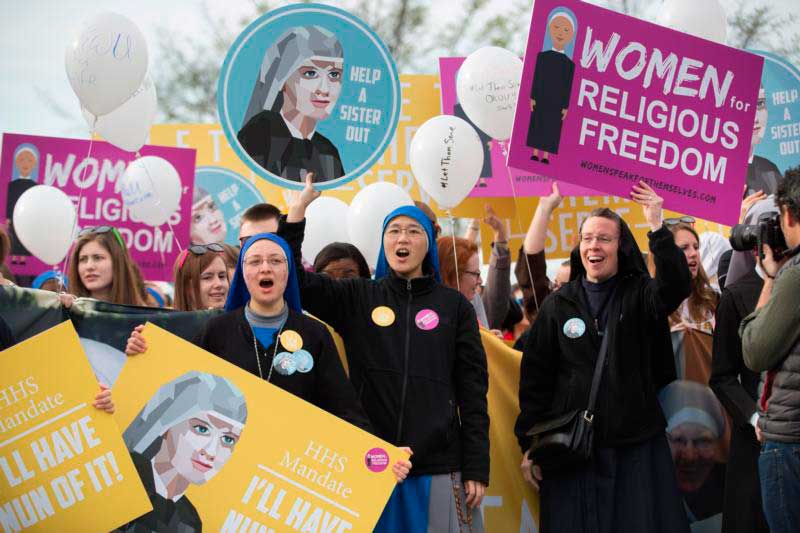
WASHINGTON—The U.S. Supreme Court sent the Zubik v. Burwell case, which challenges the Affordable Care Act’s contraceptive requirement for employers, back to the lower courts on May 16.
The justices’ unanimous decision, explained in a nine-page unsigned opinion, was based on the information that both sides submitted a week after oral arguments were heard in the case about how and if contraceptive insurance coverage could be obtained by employees through their insurance companies without directly involving religious employers who object to this coverage.
The court made clear that it is not expressing an opinion on the merits of the cases that are challenging aspects of the federal government’s health legislation and it also was not ruling on the issue of a potential violation of religious freedom.
 Because of the “gravity of the dispute and the substantial clarification and refinement in the positions of the parties,” the court stated that religious employers and the government should be “afforded an opportunity to arrive at an approach going forward that accommodates petitioners’ religious exercise while at the same time ensuring that women covered by petitioners’ health plans receive full and equal health coverage, including contraceptive coverage.”
Because of the “gravity of the dispute and the substantial clarification and refinement in the positions of the parties,” the court stated that religious employers and the government should be “afforded an opportunity to arrive at an approach going forward that accommodates petitioners’ religious exercise while at the same time ensuring that women covered by petitioners’ health plans receive full and equal health coverage, including contraceptive coverage.”
The court stressed that this approach is “more suitable” than addressing the refined positions submitted by both sides and added that “although there may still be areas of disagreement between the parties on issues of implementation, the importance of those areas of potential concern is uncertain, as is the necessity of this court’s involvement at this point to resolve them.”
Five appeals courts had ruled in favor of the contraceptive mandate and one had ruled against it. But now, equipped with the new information both sides submitted to the Supreme Court, the lower courts have been ordered to review these cases once more.
Justice Sonia Sotomayor and Justice Ruth Bader Ginsburg wrote separately to stress that the court had not decided any of the legal questions in the cases and cautioned the lower courts not to read anything into the new opinion.
“This is a game-changer,” said Mark Rienzi, lead attorney for the Becket Fund for Religious Liberty, which represents the Little Sisters of the Poor, one of the group’s challenging the federal contraceptive mandate.
He said the opinion reflects that the court has “accepted the government’s concession” that it can provide contraceptives to women “without using the Little Sisters.”
He also was pleased the court was forbidding the government “from fining the Little Sisters even though they are refusing to bow to the government’s will. It is only a matter of time before the lower courts make this victory permanent,” he said in a May 16 statement.
Washington Cardinal Donald W. Wuerl had a more nuanced look at the court’s opinion, saying he was pleased that it offered a path forward, but he also acknowledged that “this struggle will continue.”
The Washington Archdiocese is one of several plaintiffs in this case.
The cardinal said the archdiocese will continue its work to “serve others in education, health care, social services, and outreach to the poor and those most in need. We will continue to do that because we are resolute that it is precisely by being true to our Catholic identity in what we proclaim and in what we do that we can continue to help realize a truly good and just society.”
Archbishop Joseph E. Kurtz of Louisville, Kentucky, president of the U.S. Conference of Catholic Bishops, said he was encouraged by the court’s decision. “It maintains hope that we might resolve this dispute finally and favorably sometime in the future, and in the meantime, it prevents the administration from issuing crippling fines against those who object” to the health care law’s contraceptive mandate.
Bishop David A. Zubik of Pittsburgh, for whom the consolidated group of cases is named, said in a statement that the Pittsburgh Diocese was grateful the justices “recognize our willingness to reach a resolution that allows us to abide by our faith and the government to achieve its goals.”
“We have already stated our willingness to come to such an agreement and we hope that the government shares that willingness,” he added.
“Burwell” in the case name is for Sylvia Mathews Burwell, who is secretary of the Department of Health and Human Services.
Father Frank Pavone, national director of Priests for Life, another of the plaintiffs, said he and other in his organization are “studying the implications of this development and are encouraged by it.”
He said the group, in response to the court’s request for more information, showed that there is “a way for the government to pursue its objectives without burdening our freedom of religion. We are ready to present these new arguments in the court of appeals.”
This is not the first time the court has sent a case back to the lower courts in light of new developments.
The opinion stressed that sending the case back to lower courts should not affect the government from making sure women covered by petitioners’ health plans obtain FDA-approved contraceptives, but it also means the government “may not impose taxes or penalties on petitioners for failure to provide the relevant notice” stating their objection to the coverage.
The court’s opinion “can be seen as both a reset and a pause,” said Richard Garnett, a University of Notre Dame law professor, who said the decision doesn’t end the argument but it “wipes away” several lower court opinions that had ruled against the religious challengers. He said the court’s action also delays a further ruling until a new justice is on the court.
Garnett said if Justice Antonin Scalia were still on the bench, a majority would have likely ruled in favor of the Little Sisters of the Poor and the other challengers.
“The government’s admissions in oral argument and in the supplemental briefs appear to have made it possible for the justices to avoid a confusing and inefficient 4-4 tie and for all eight to agree on this intermediate step,” he added.
Legal analyst Lyle Denniston, who writes for scotusblog.com, a blog on the Supreme Court, similarly pointed out that the court’s attempt at compromise shows how it is “having to adjust its actions to deal with the fact that it is one justice short of its normal membership.”
He also noted that varied reactions to the court’s opinion shows that it “may take some time for observers to sort out just what the court has done and its implications.”
Oral arguments for Zubik v. Burwell were heard March 23 and the court asked for additional information March 29. The case involves the Little Sisters of the Poor, Priests for Life, the Pennsylvania dioceses of Pittsburgh and Erie, and the Archdiocese of Washington and other religious groups challenging the Affordable Care Act’s mandate that most religious and other employers must cover contraceptives, sterilization and abortifacients through employer-provided health insurance.
These groups, who do not fit the narrow exemption to the contraceptive mandate given to churches, argued that providing contraceptive coverage even indirectly through a third party, as the Obama administration allows through what it calls an accommodation, still violates their religious beliefs.
By Carol Zimmermann | Catholic News Service
Top: CNS photo/Jaclyn Lippelmann: Women religious and others demonstrate against the Affordable Care Act’s contraceptive mandate March 23 near the steps of the U.S. Supreme Court in Washington, when the court heard oral arguments in the Zubik v. Burwell mandate case.
Second photo by Will Frei | Special to The Catholic Miscellany



